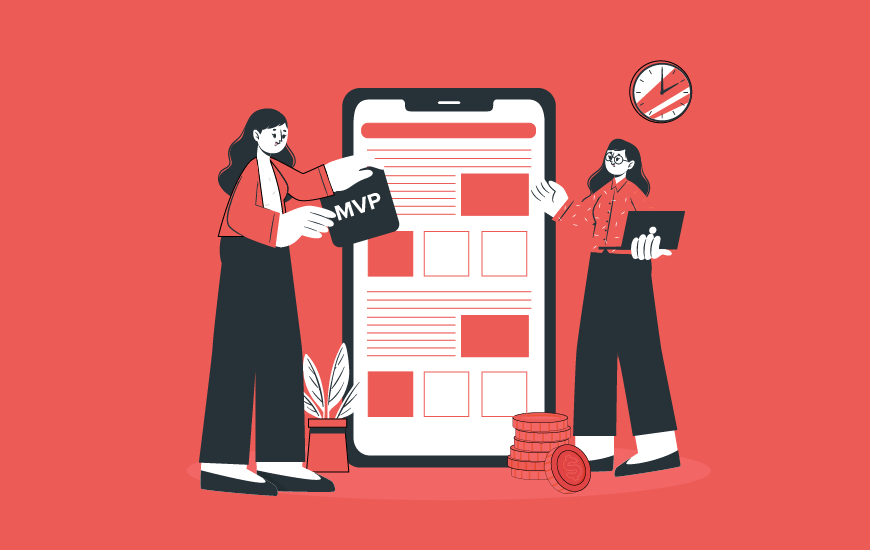- Top 4 MVP Development Benefits to Attract Investors
- Investors Can Check Product Functionality
- Investors Can Ensure Product’s Viability in the Market
- Investors Rely on Your Team
- Investors Can Check Your Team’s Market Awareness
- Real World Examples of Companies that Started with MVPs
- Snapchat
- Airbnb
- Uber
- How to Build an MVP?
- Conduct Market Research
- Identify Your Target Market
- Outline Key MVP Features
- Build and Launch MVP
- Analyze the Feedback
- How Much Does it Cost to Develop an MVP?
- How to Find Investors to Raise Funding on Your MVP?
- Research about Investors
- Focus on the Future
- Create a Pitch that Resonates with Investors
- Be Prepared to Answer Questions
- Optimize Your Cash Position
- Types of Funding Partners for MVP Fundraising
- Community Development Financial Institution (CDFI)
- Government Agencies and Programs
- Angel Investors and Venture Capitalists
- Crowdfunding
- Friends and Family
- Embark on Your MVP Development Journey with Appinventiv
- FAQs
Facebook, TikTok, Tinder, Uber, Instagram, Zoom, Spotify — today, all these big players are making a fortune in their respective industries. They have multifunctional applications with intuitive features and app designs to give an immersive user experience. However, it was not always the scenario. There was a time when these leading platforms used to have nominal features and a primitive UI/UX design.
For instance, Mark Zuckerberg’s popular social media platform, Facebook, was first introduced as a minimum viable product (MVP) on February 4, 2004, to connect Harvard University students via a social network. During its initial phase, Facebook’s MVP had much simpler features, such as User Profile, News Feed, Friend Request, Photo Album, etc., compared to the feature-rich platform we use today.
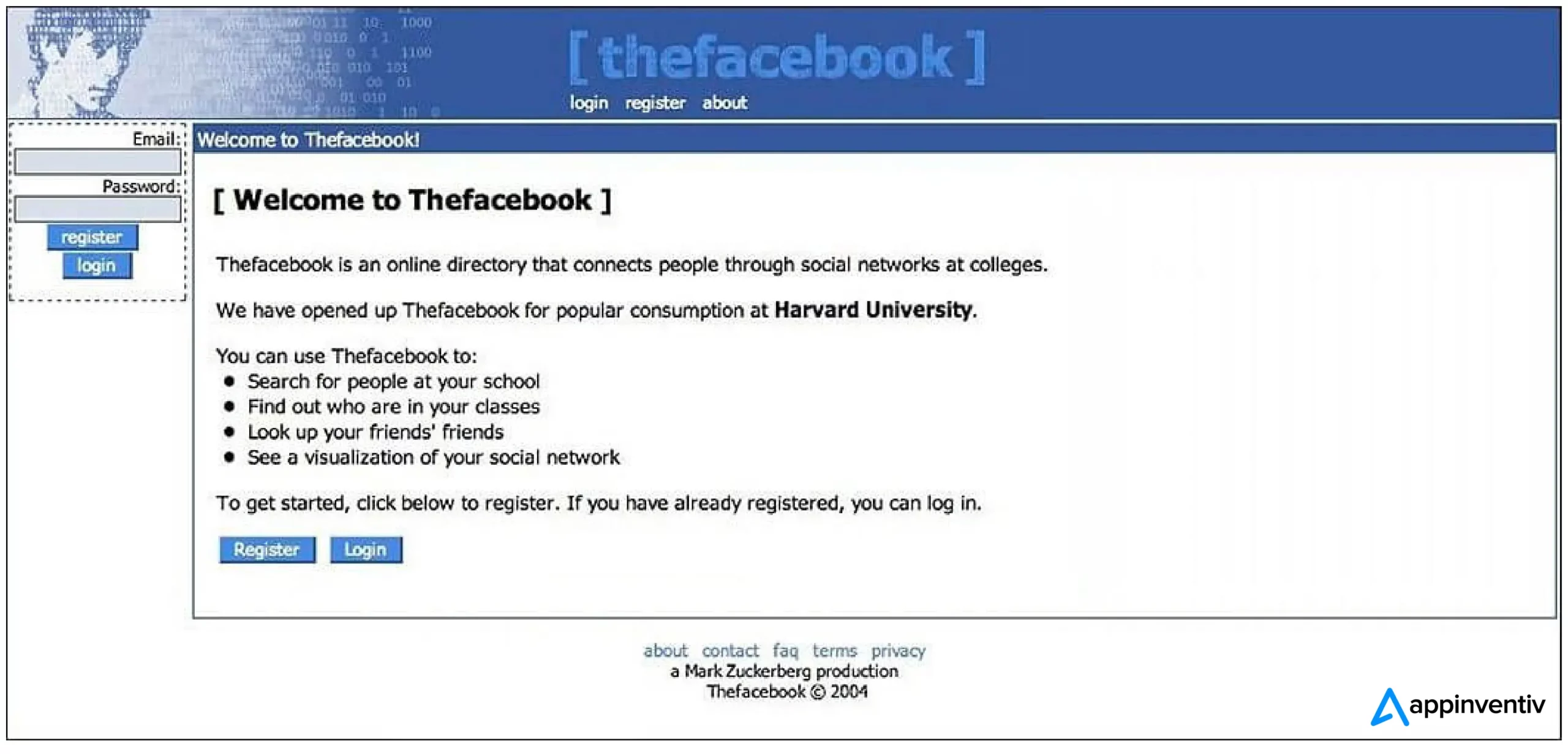
Through an MVP, this social media platform gradually evolved over time and extended its reach by introducing more features and adding more functionalities. At present, Facebook is one of the largest social media platforms, with more than 2.99 billion monthly active users.
The ever-increasing market size of Facebook testifies that building a minimum viable product (MVP) is a great way to test the success of a business idea at a minimal cost. This incremental approach of starting small and scaling over time not only minimizes the initial investment but also allows for flexible adaptation to user feedback.
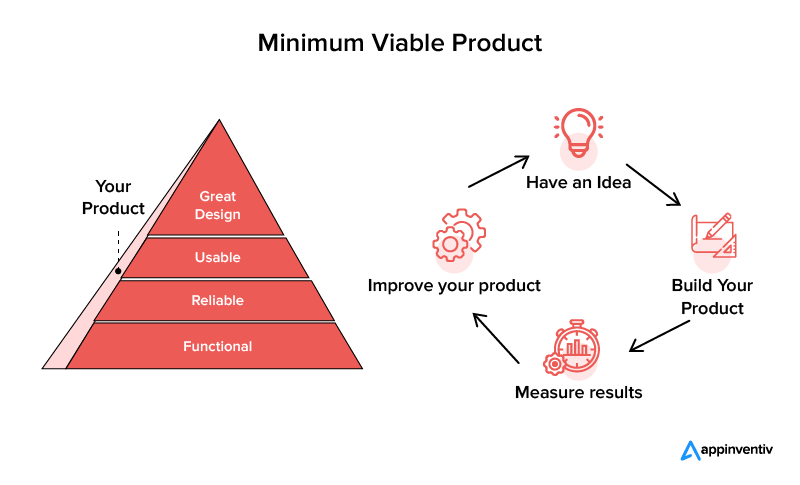
By designing and building an MVP, businesses can test their concept with real users and make necessary iterations before releasing the final version. Undoubtedly, having an MVP solution is beneficial to reduce risk, save money, and get funding.
Are you interested in the idea but unsure how to build an MVP for your business? Here is a step-by-step guide to help you build a successful MVP that can raise money from investors.
However, before discussing the MVP development process, let us first quickly glance through the immense benefits that this integral phase of mobile app development offers.
Top 4 MVP Development Benefits to Attract Investors
MVP development for startups has grown exponentially in recent years as businesses of all sizes, from startups to enterprises, recognize its multifarious advantages. Accordingly, MVP development has been a crucial phase of the product development process, particularly when seeking MVP investors. Let’s discover its top four benefits that ensure a successful product launch and drive MVP investors.
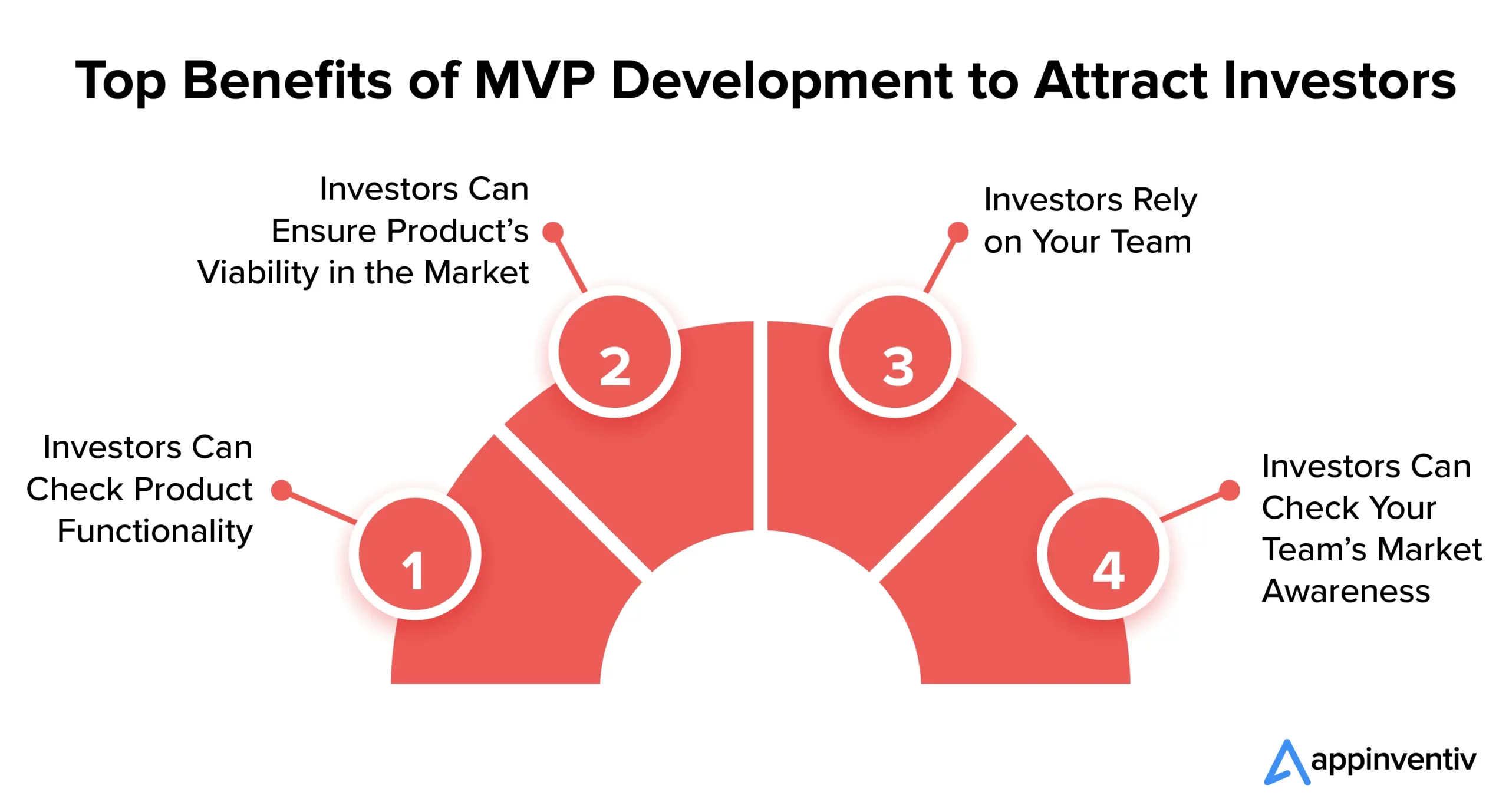
Investors Can Check Product Functionality
When it comes to product development, the minimum viable product framework is essential to secure investment funding. It allows MVP investors to see the product’s functionality and how it can be used to solve a real-world problem. On the other hand, products that are still in the early stages of development can be much harder to sell to investors, as they may not be able to see the potential value of the product.
Additionally, MVPs help ensure that products are developed in a customer-centric way, as they allow for feedback from real users and use it to improve the product before launching it to the wider market. This feedback is essential for making a full-fledged product before seeking MVP funding from investors. Moreover, by clearly demonstrating the commitment to the product, the MVP in startups can increase their chances of success and attract MVP investors.
Investors Can Ensure Product’s Viability in the Market
The main purpose of MVP app development is to test whether the product is viable in the marketplace. It means testing whether the market has a demand for the product and whether users are interested in paying for it.
Since MVP is open for user feedback and modification, it helps reduce the risk of business failure and increase the chances of success. For investors, an MVP provides a way to ensure whether the product is likely to be successful, assisting them in making confident investment decisions.
Investors Rely on Your Team
A wise investor always knows that it is the team that ensures the success of any new venture. A strong team can make even the most challenging project a huge success, while a weak team is likely to fail no matter how good the underlying idea may be. It is why MVP investors often prioritize checking the minimum viable product before committing to a new project.
A successful MVP development ensures that the team behind the venture has the skills and experience necessary to succeed. So, if you are looking to raise funding for your new project, make sure to partner with a reputed MVP development company like Appinventiv that will impress even the most skeptical investors. Appinventiv has a team of skilled professionals who have a wealth of experience in MVP building. Hence, it can help give investors the confidence they need to invest in the product.
For instance, our passionate team created a job search application, JobGet that brought the entire recruitment process to mobile, from finding suitable candidates/employers to conducting interviews and so on. Also, to make the job seeking process location-specific and time-friendly, we integrated AI technology. As a result, the job search time through the app was reduced from days to minutes. It helped JobGet bag a massive funding of $52 million and become the no.1 recruitment app for blue-collar workers.
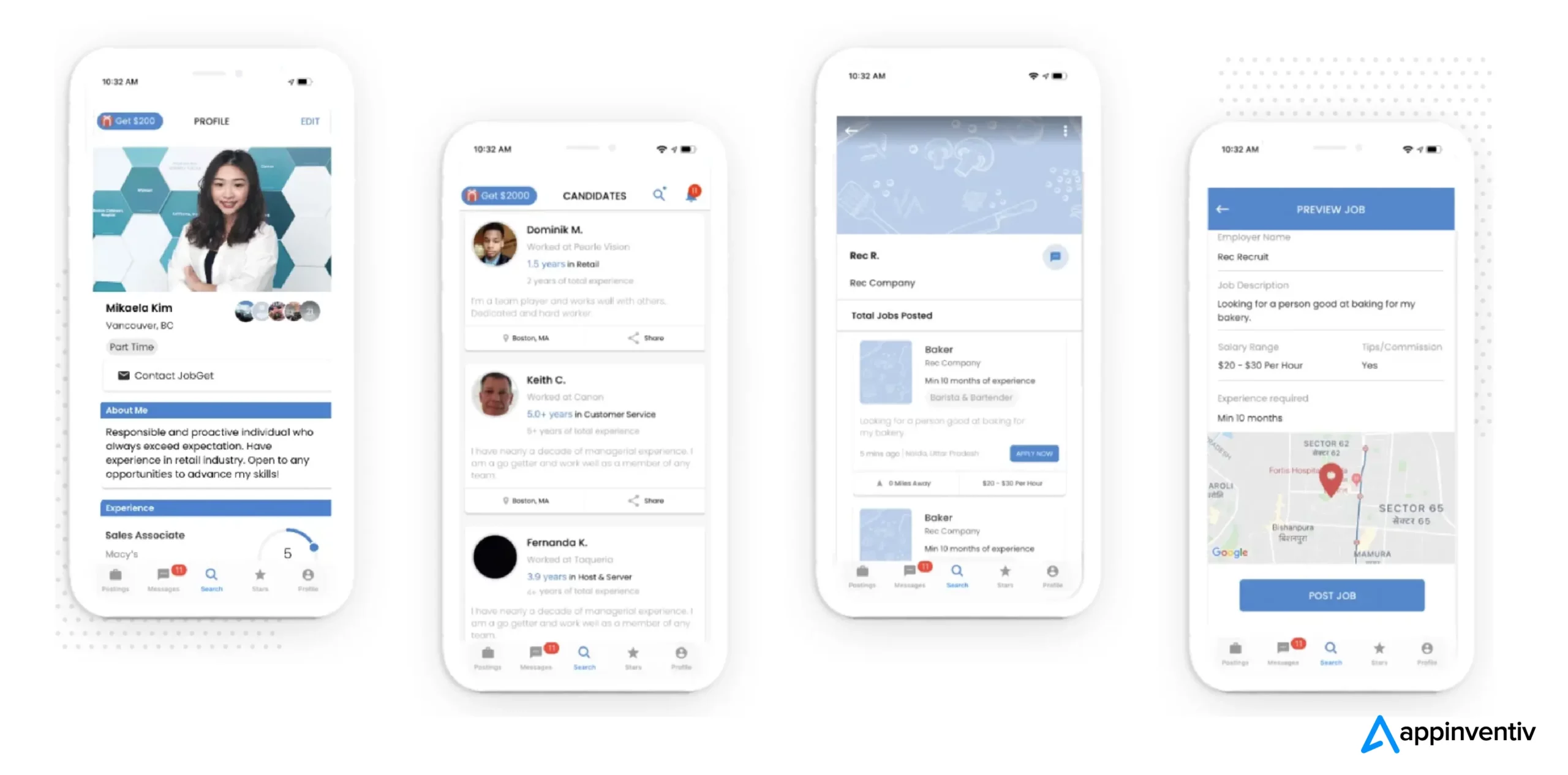
Investors Can Check Your Team’s Market Awareness
Market analysis is an important part of MVP app development, helping investors know that your team is aware of the market conditions and can quickly adapt to them. For instance, for successful MVP building, you research your competition, the core purpose of your product, its benefits, and its unique features.
The investors know MVP development requires much more effort, research, and preparation than a simple pitch arrangement. They know you will not spend your valuable resources on its creation without knowing the market. Hence, MVP building demonstrates that you have a deep understanding of the market, which will help you gain investors’ trust.
You may like reading: 21 Solid Ways to Validate Your Minimum Viable Product.
Now that we know the benefits of the minimum viable product for the investors; let’s walk through the steps to build an MVP.
Real World Examples of Companies that Started with MVPs
There are a number of real-life examples of industry leaders that stepped into the business world through an MVP and turned into big brand names that we interact with in our day-to-day lives today. Here are some world-famous businesses that started with a minimum viable product.
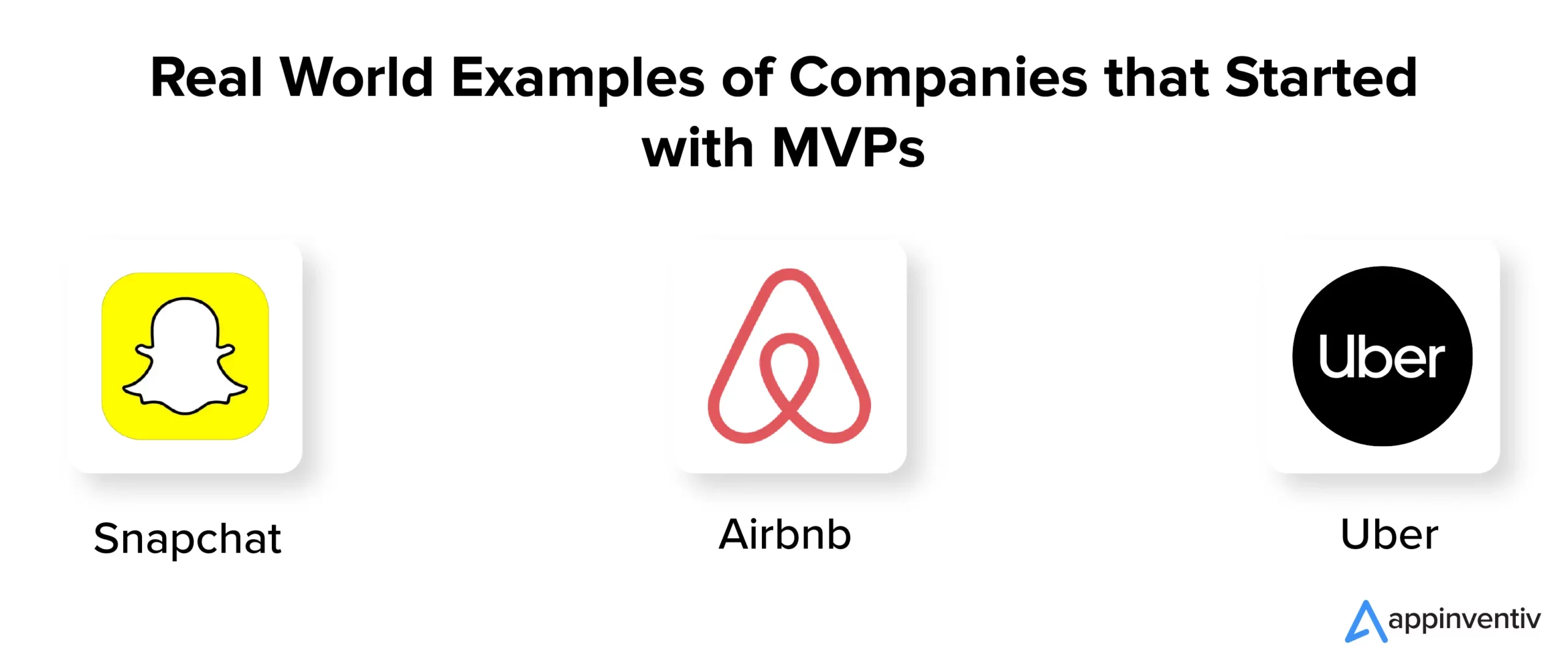
Snapchat
In 2011, the students of Stanford University came up with a breakthrough idea to develop a social media platform that can allow users to post content that can disappear after a few moments. So, they built Picaboo (Snapchat MVP), allowing users to post photos. It was a huge hit among youngsters. After a couple of successful years, Snapchat added other useful features like 10-second videos, Stories, and Chat. Today, Snapchat has more than 363 million daily active users worldwide.
Know how much it costs to develop a social media app like SnapChat.
Airbnb
Two San-Francisco based men with a tight budget decided to rent out the top floor of their apartments to visitors. To promote their business idea, they built a website MVP with a basic landing page that had their housing pictures on it. Its core purpose was to check whether visitors were interested in booking the apartments, and yes, they were.
Know how much Airbnb-like app development costs.
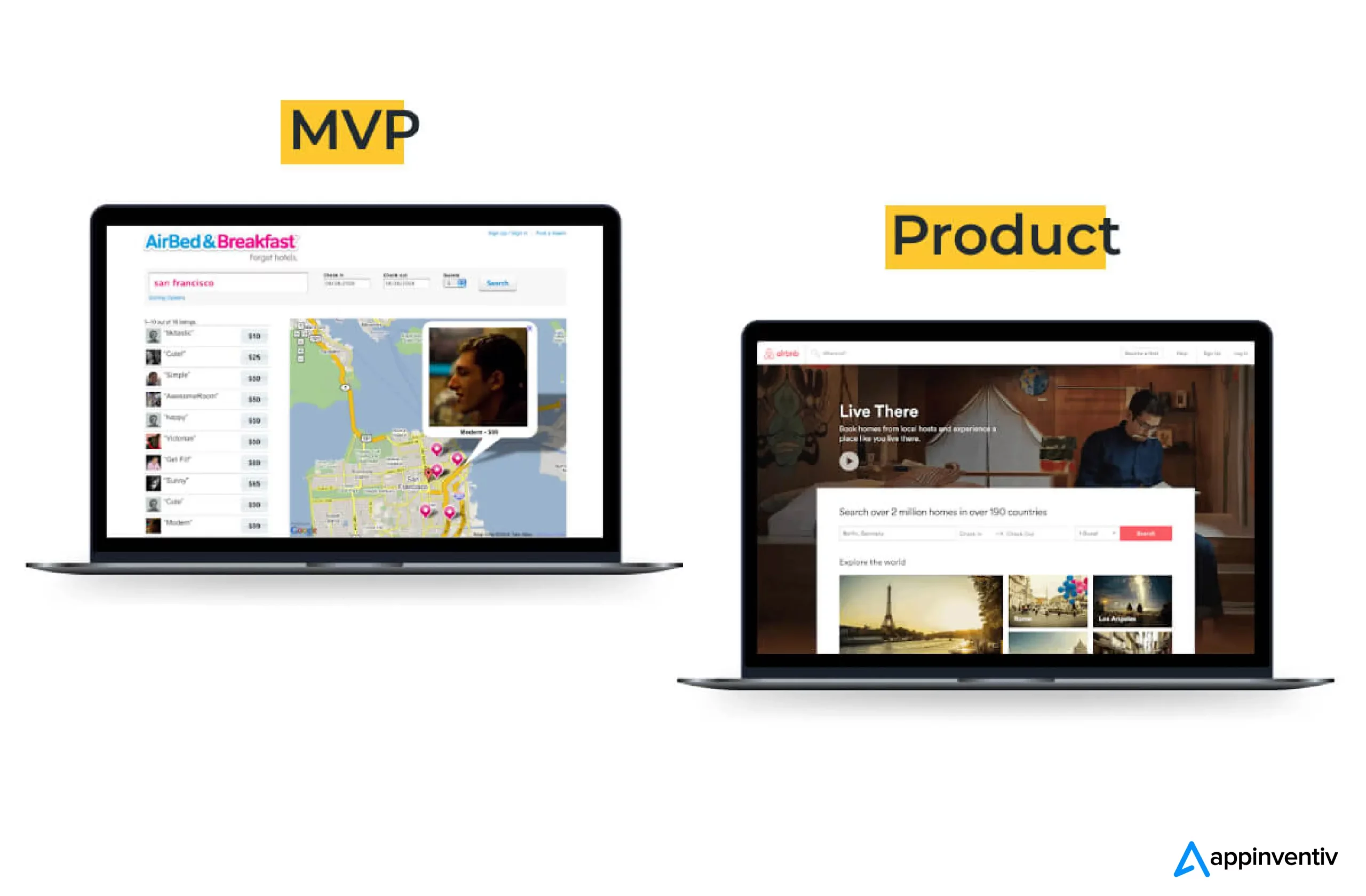
Uber
You can instantly notice the difference between the MVP version and the full-fledged application of Uber. Frustrated by the high cost of San Francisco taxis, the co-founders of Uber, Garrett Camp, and Travis Kalanick, came up with a business idea to connect iPhone users with cab drivers and enable credit card payments. They developed an MVP to check if travelers were ready for a new taxi experience. Today, Uber has a market cap of $95.58 Billion, which makes it stand at 152 in the list of the world’s most valuable companies.
Know how much it costs to develop an app like Uber.
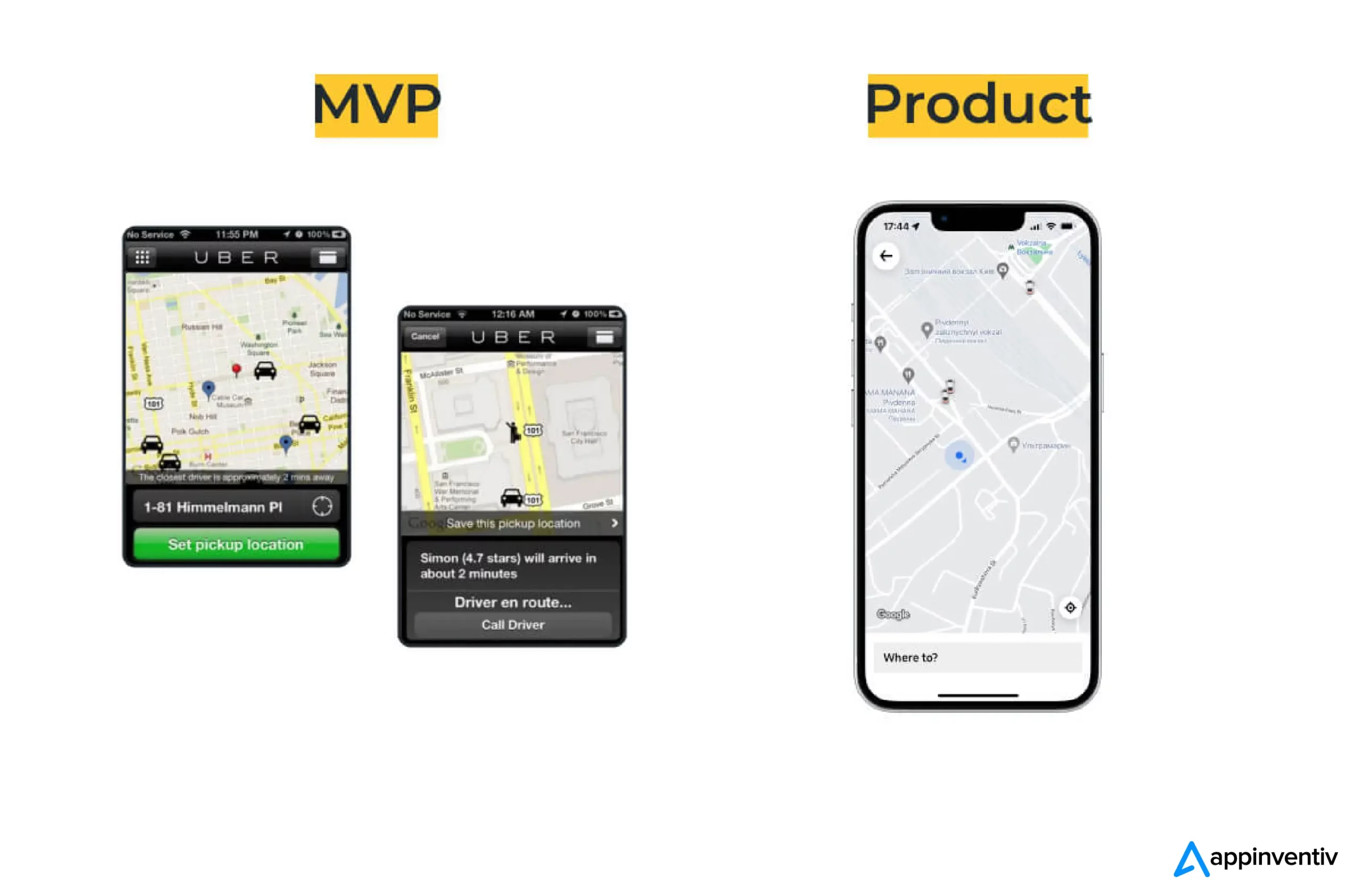 How to Build an MVP?
How to Build an MVP?
Building an MVP involves a systematic approach and strategic planning to create a basic version of your product with essential features which validate your app idea and gather user feedback. This feedback ensures the refinement and success of your final product. Here’s a step-by-step guide on how to build an MVP that can garner investors’ attention:
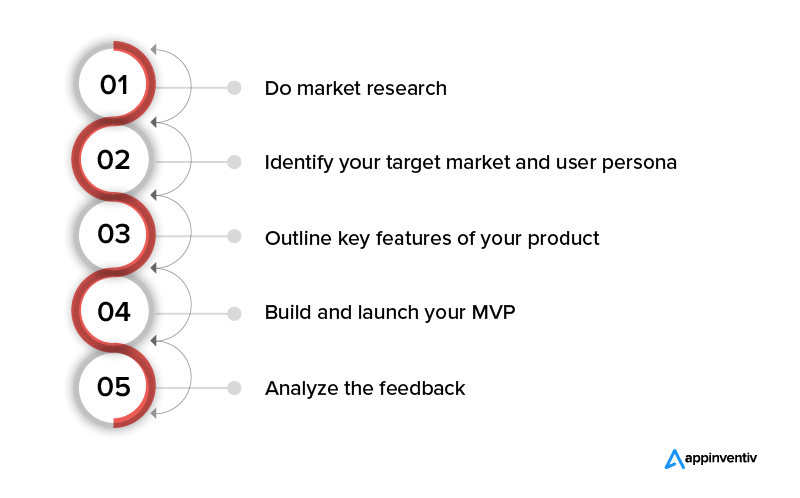
Conduct Market Research
The first and foremost step to MVP development starts with conducting market research. It will help you understand the ever-changing needs of your target market and what they are looking for in a product or service. Many platforms conduct paid surveys and can help target the right respondents for your MVP in business.
Identify Your Target Market
The next step is to identify your target market and user persona. It includes identifying the demographics of your target market by asking yourself several questions like:
- Who is your target user?
- What are their needs?
- Why would they use your solution? And so on.
Once you have figured out all the answers to these questions, you can easily determine who will use your MVP and what needs it should address.
Outline Key MVP Features
Now that you know your target market and their needs, it’s time to outline the key features of your product. It includes identifying the core functionalities of your MVP solution and services. Remember, less is more when it comes to a minimum viable product. Hence, you should focus only on the essential features that will address the needs of your target market.
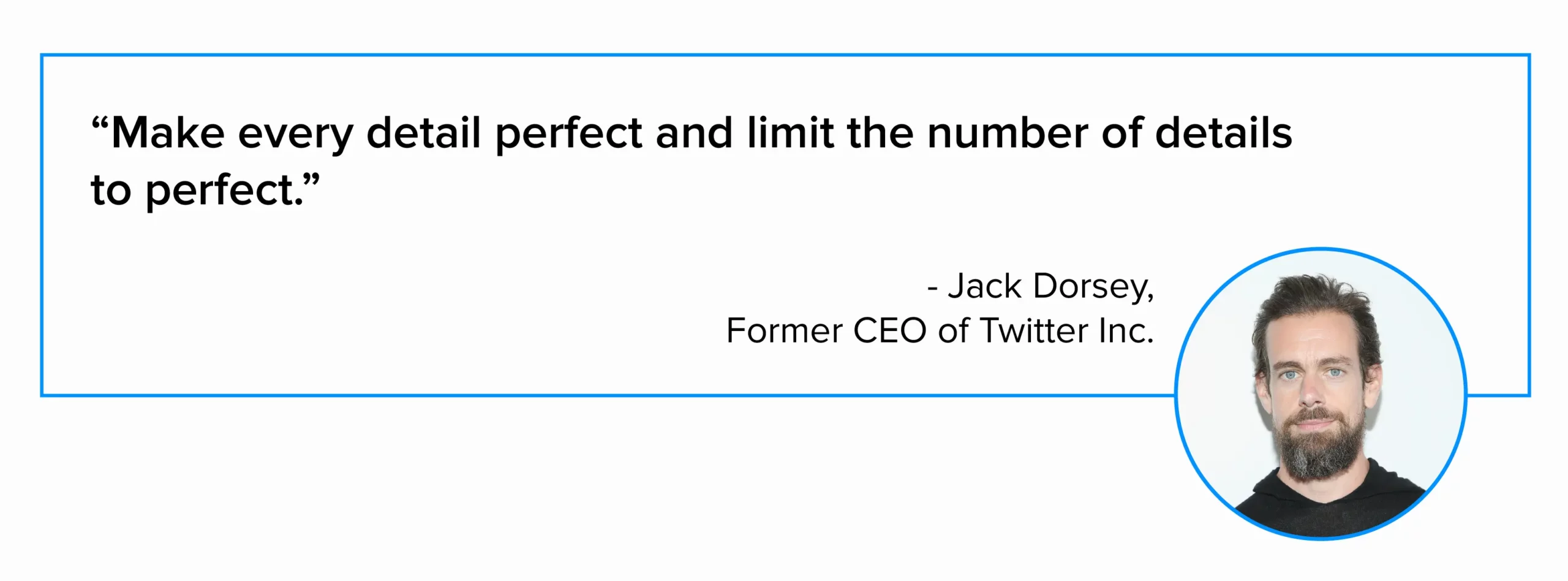 Build and Launch MVP
Build and Launch MVP
Once you have defined the features list, you can go ahead to build and launch MVP. You can partner with an MVP development company to build a user-friendly product and make it available to the target market. This step also involves promoting your minimum viable product and getting user feedback for value enhancements. The feedback you receive will be invaluable as it will help determine what features to add or remove and how to improve your product or service.
Analyze the Feedback
After you have launched a minimum viable product, it’s time to analyze users’ feedback and figure out what is working and what is not. Remember, a minimum viable product will have flaws and areas of improvement. However, the feedback and data you receive will help refine your product and eventually develop a full-fledged feature-rich version for the end users.
While there is no one-size-fits-all answer to how to build an MVP, the above-mentioned steps will give you a good starting point. Remember, the goal of developing a minimum viable product is first to attract an investor. If your product fails to attract an investor, why waste your valuable time, money, and resources on such a project? With that in mind, let’s discover how to find investors for your MVP project management.
How Much Does it Cost to Develop an MVP?
Having known the steps of how to build an MVP, another significant question that strikes an entrepreneur’s mind is its development cost. Even if the cost of building an MVP is lower than the complete app development cost, it can still come with a hefty price tag if you don’t evaluate the considerable factors. On average, the cost to build a minimum viable product can range from $15,000 to $150,000, depending on various factors. These factors include but are not limited to the product complexity, functionality, UI/UX design, location of the MVP development team, and of course, the industry you are operating in. Therefore, it is imperative to consider the various factors involved in MVP software development.
For instance, an MVP for a video-calling app can cost between $30,000 and $50,000, a food delivery app or website MVP can cost between $42,000 and $51,000, and an MVP for real estate can cost around $45,000.
The cost to build an MVP is typically less and is less risky than traditional product development, making them appealing to investors. To get an accurate estimate of MVP app development cost, feel free to connect with our efficient team and discuss your product idea now.
How to Find Investors to Raise Funding on Your MVP?
The first and foremost thing that comes to an entrepreneur’s mind while building a project is how to raise funding. So, if you have developed a minimum viable product and are now looking for potential investors, here’s what you need to do.
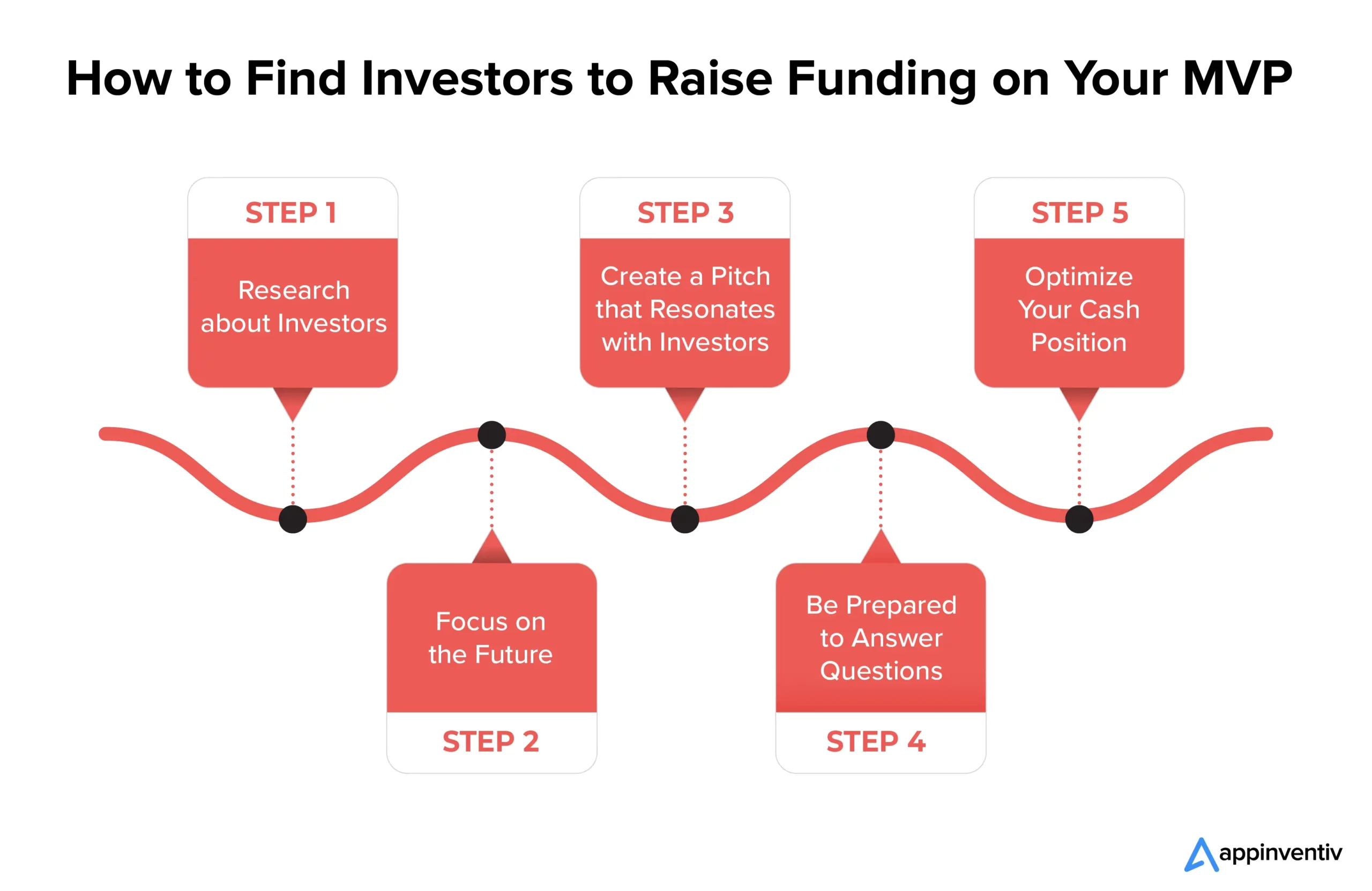
Research about Investors
It is challenging to raise money for new products, applications, or services, even if it is a great idea. One way to increase your chances of success is to research potential investors thoroughly. It includes knowing their MVP investment history and understanding their objectives.
By presenting a product that aligns with their interests, you are more likely to secure MVP funding. Furthermore, during an economic downturn, it makes great sense to be aware of the potential investors’ needs. During this phase, they can be more frugal and risk-averse than boom times.
Focus on the Future
When pitching your product to potential investors, it’s important to focus on the future, not the past. It means highlighting the potential of your product and its ability to grow in the future. For example, if you pitch a new social media app, you should focus on the potential user base and how the users will use the platform to connect with one another. Here, the key is to convince investors that your product has the potential to come off with flying colors in the future and that their investment will pay off.
Create a Pitch that Resonates with Investors
Once you have made a list of potential investors, it’s time to create a compelling pitch that resonates with them. It means focusing on the most valuable aspects of your product that can appeal to investors and emphasize the feasible return on MVP investment.
For example, if your product is a food delivery app like KFC, you should focus on the growing online ordering and delivery trends. You can also highlight the potential for repeat customers and their loyalty to businesses that offer convenient delivery options.
It makes investors believe in your ability to launch the product successfully. By crafting a pitch that resonates with potential MVP investors, you will be in a better position to raise the money for your mobile application.
Be Prepared to Answer Questions
When pitching a minimum viable product to potential investors, you must be prepared to answer the volley of questions your investors can ask. It means being honest about the risks and challenges associated with your product.
For example, if you are pitching a new food delivery app like Pizza Hut, you should be prepared to answer questions about the competitive landscape, the potential for customer attrition, and the scalability of your business model. By being honest and transparent about the risks involved, you will be better positioned to secure MVP funding.
Optimize Your Cash Position
Finally, it’s important to optimize your cash position before pitching your product to potential investors. It simply means having a clear understanding of your burn rate and ensuring that you have enough cash in hand to sustain your business in the event when you are not able to raise funding. Additionally, it’s important to have a clear plan for how you will use the funds. It will give investors confidence in your ability to launch and grow your business successfully.
Types of Funding Partners for MVP Fundraising
Even if MVP app development is a vital step for any business, it’s not the final stage. To take your business to the next level and achieve long-term success, let’s look at the main type of MVP funding sources that are helpful to approach during the pre-seed funding and seed funding rounds.
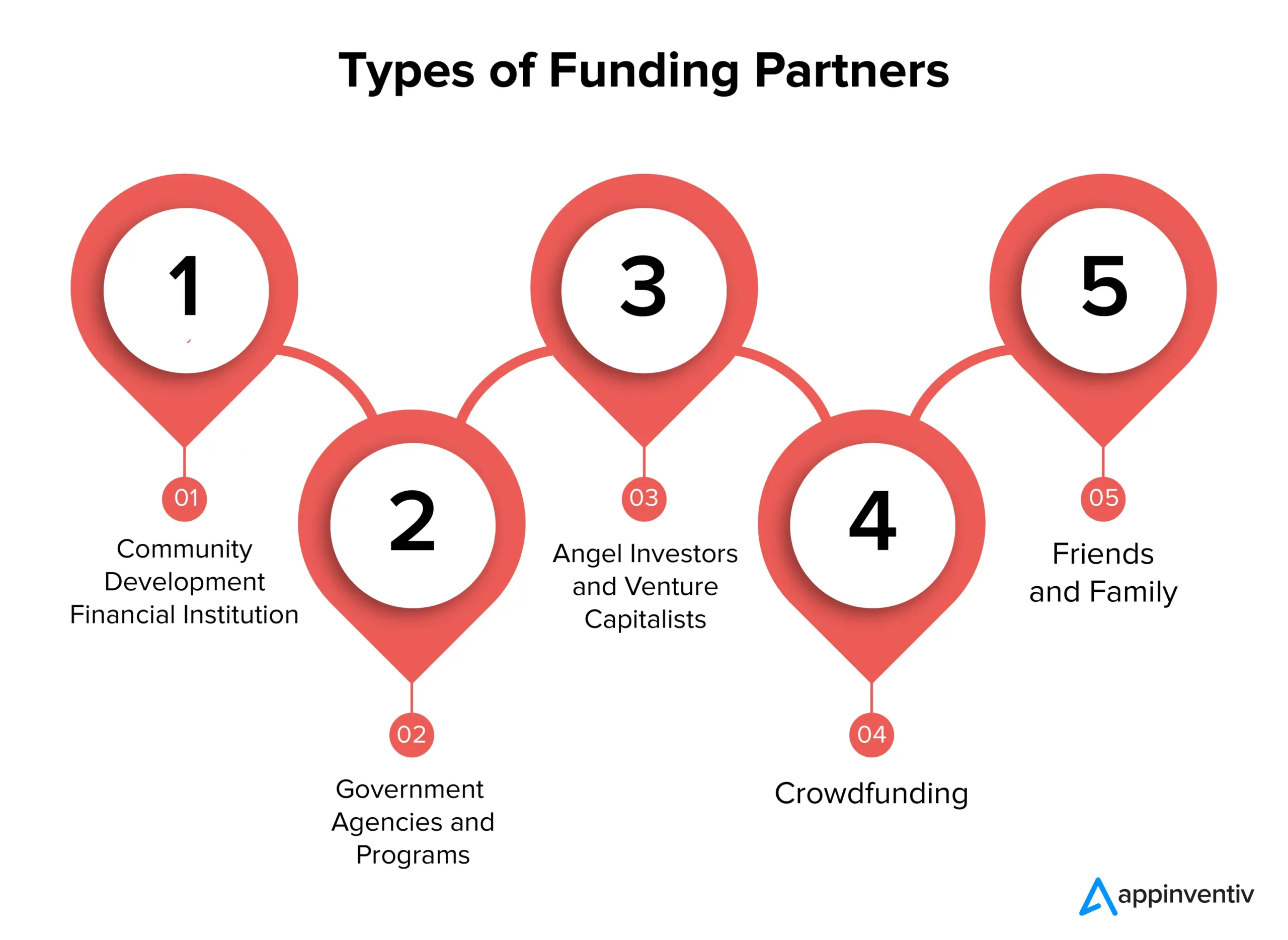
Community Development Financial Institution (CDFI)
There are many CDFIs that invest in businesses in low to moderate-income (LMI) communities. While their primary focus is on economic development, they also invest in businesses that will create jobs and spur economic growth. As such, they can be a good source of funding that is looking to launch in LMI communities.
Government Agencies and Programs
Federal, state, and local governments offer a variety of programs and incentives to promote entrepreneurship and economic development. These can include loans, grants, and other forms of financial assistance.
Angel Investors and Venture Capitalists
Angel investors and venture capitalists are typically high-net-worth individuals who invest in early-stage companies in exchange for equity. While they typically focus on high-growth companies, they can also be a source of funding for the minimum viable product with high potential.
Crowdfunding
Crowdfunding is a way of raising capital by pooling small amounts of money from a large number of people. It can be a good source of funding for MVPs that have a compelling story and are able to generate interest among potential investors.
Also Read: How to build a real estate crowdfunding platform like Fundrise?
Friends and Family
Friends and family can also play an integral part in MVP fundraising, particularly if they support your business idea and believe in your ability to succeed. Remember that they are also taking a risk by investing in your company, and as such, you should treat them as you would any other investor.
Embark on Your MVP Development Journey with Appinventiv
MVP development is a critical step in the process of raising money for your software or application. A professionally built MVP decides the overall success of your final product and business idea. Remember, Airbnb, WhatsApp, Facebook, etc., all started as MVPs and now are the unicorns of their respective industries.
For successful MVP building that can raise funds, make sure to partner with a reputed app development company like Appinventiv.
The process of building MVP at Appinventiv is pretty similar to the one mentioned above. However complex or large your project idea is, our efficient team will help you turn your breakthrough vision into a million users’ reality. Through our MVP development services, we have already built hundreds of products for our global clients across industries and helped them bag a funding of a whopping $950 Million.
For instance, our skilled team built an audio-commanded social media app, Vyrb. The integrated audio command features allow users to post, listen, and respond to social media posts with their voices. This next-gen feature helped Vyrb secure more than $1 million funding.
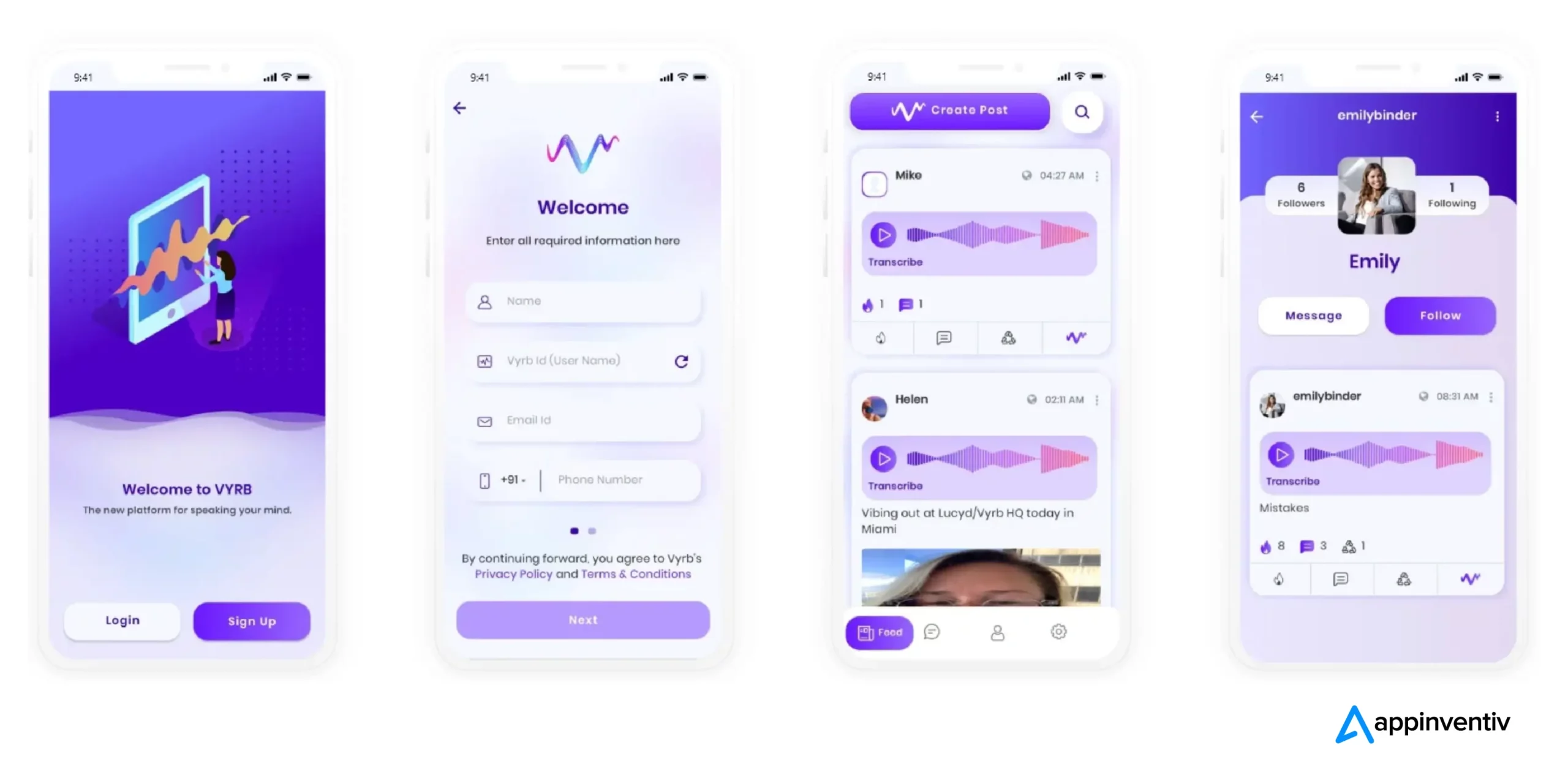
For another client, Edfundo, we developed a financial literacy and smart money management app, making it become the world’s first financial intelligence hub for kids. The app helped the client form a partnership with Visa and NymCard and bag pre-seed funding of $500,000.
Still unsure about how to build an MVP that can raise funding for your business, contact us now, we will be glad to assist you.
FAQs
Q. Do you need an MVP to get funding?
A. While an MVP can be a helpful tool for attracting investors, it is not always necessary. In some cases, a well-developed prototype may be enough to demonstrate the app’s potential and persuade investors to provide funding. However, there are also situations where an MVP can be essential.
For example, if the app requires significant investment to get off the ground, in that case, an MVP may be the only way to convince investors to provide the necessary capital. So, whether you need to develop an MVP to get funding will depend on your specific situation and the type of app you want to develop.
Q. What is MVP in product development?
A. The MVP is an initial version of a product that includes essential features and functionalities for early testing and validation. MVP allows entrepreneurs to demonstrate the viability of their business idea to potential investors and users and raise further funding for full-fledged product development. An MVP may be scrapped altogether if it fails to impress customers.
Q. How to build an MVP?
A. To build an efficient MVP that can help you raise funding, you need to follow the below listed steps:
- Conduct market research
- Define your project objectives
- Design wireframes or a prototype of the MVP
- Develop an MVP with core features
- Launch the MVP for testing and feedback
Q. How long does it take to build an MVP?
A. The time it takes to build an MVP varies depending on various factors such as the product’s complexity, industry, experience of the development team, etc. On average, building an MVP may take approximately 3-4 months.



How to Hire an App Developers in Australia?
Australia is rapidly becoming a hub of technological innovation. Businesses across sectors are thriving due to advancements in scalability through digital transformation and cutting-edge solutions. With a strong focus on fostering creativity and growth, the tech landscape has become a driving force behind business success. Among the innovations propelling industries forward, mobile apps have emerged…
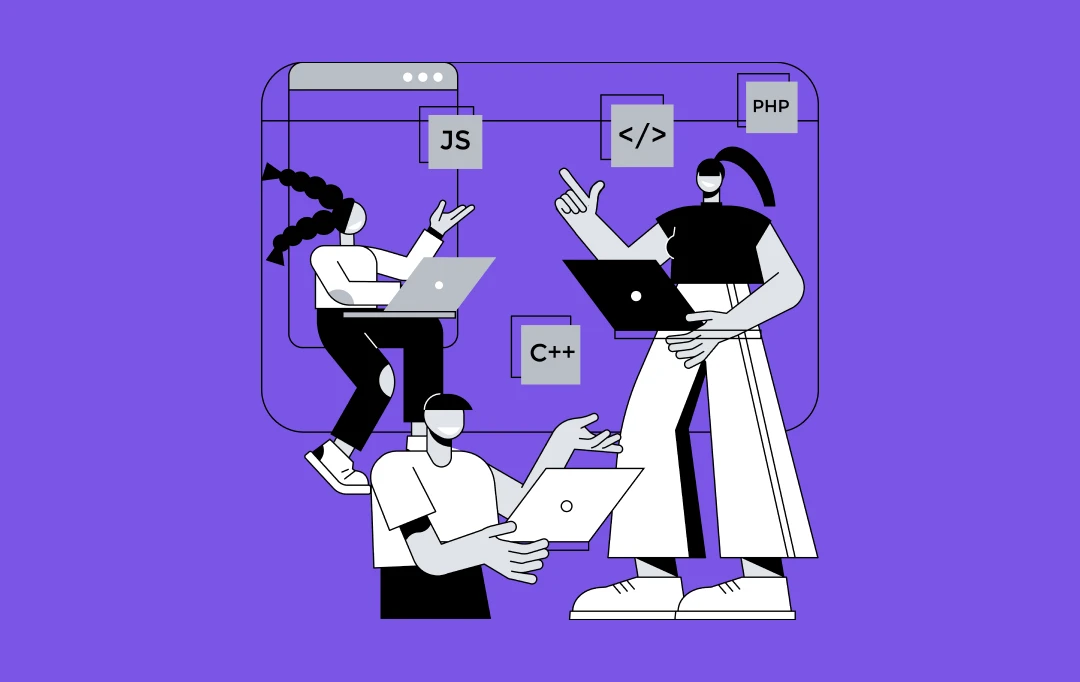
How to Hire the Best Mobile App Developer in Dubai, UAE? Key Steps, Costs, and More
The prominence of mobile apps across various industries, including healthcare, eCommerce, and finance has become a global phenomenon, revolutionizing the way businesses operate and interact with their customers. These apps have enabled professionals and users alike to interact seamlessly across distances, breaking down geographical barriers and providing services that were once only available in person.…





